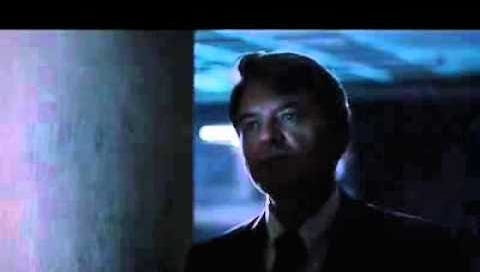Hal Holbrook in All the President’s Men (1976)
“Everybody I went to college with is a bond trader living in Mill Valley, California,” my late first wife Marjorie Williams observed one day while paging through her Harvard class alumni book. Marjorie was a Harvard dropout, following proudly in the steps of Bonnie Raitt and Bill Gates and setting a future example for Matt Damon and Mark Zuckerberg. But she still got sent periodic updates on what the class of 1979 was up to, and she devoured them. Obviously “in Mill Valley, California” was comic exaggeration; Mill Valley has only about 14,000 inhabitants, and if every one of Marjorie’s classmates lived there then Harvard’s class of 1979 would encompass one-seventh of Mill Valley’s population, which seems pretty unlikely. But Marjorie was right that everyone she went to college with did become a bond trader. I was a year behind her at Harvard and everyone I went to college with became a bond trader, too. As best I can make out, they still do. If you log onto the Harvard Alumni Directory and enter the phrase “fixed income” (that’s code for “bond trader”), you get nine pages of results. “I continue to work at ABN AMRO (soon to be Royal Bank of Scotland) in the Latin America fixed income group,” one alumnus reports from the class of 1993. A wedding announcement from the class of 2007 alerts us that her new husband “is a fixed income Portfolio Manager at Wellington Management.”
If you believe that the Ivy League meritocracy controls the world, as many otherwise sane people do, then you’re obliged to believe that the world is controlled by a bunch of bond traders. This is not as nuts as it sounds! In the early 1990s James Carville sat in on a White House meeting where it was explained to him that the economic stimulus President Bill Clinton had campaigned on in 1992 would have to be set aside to make room for a deficit-reduction bill because the U.S. bond markets were engaged in a massive sell-off that threatened to wreck the economy. (Bond traders ended up setting fire to about $1 trillion.) “I used to think that if there was reincarnation, I wanted to come back as the president or the pope or as a .400 baseball hitter,” a disillusioned Carville famously observed. “But now I would like to come back as the bond market. You can intimidate everybody.” Or, as Hal Holbrook, playing Deep Throat, said in All The President’s Men (the real Deep Throat, Mark Felt, never said it): “Follow the money.” That’s seldom a bad idea.
Following that chain of logic, I pursue in my latest New Republic piece the thought experiment that behind Matt Gaetz’s dethroning of House Speaker Kevin McCarthy lies the hidden hand of a powerful group that Ed Yardini years ago labelled “the bond vigilantes.” Is it paranoid? Yes, it’s a little paranoid. But hear me out. The good news is that Wall Street is begging for a tax increase, and I see no reason for President Joe Biden not to give it one. You can read the piece here.
Also, I forgot to plug a piece I published earlier this week about another economic indicator, the “private-equity drought.” Unlike the current bond market turmoil, the private equity drought is a good thing, as it’s led to fewer mergers. Most of the credit goes to the Fed, which increased the cost of borrowing But with the inflation crisis ending, it’s now going to be up to the FTC and the Justice Department to keep private-equity tycoons parched. You can read about that here.




